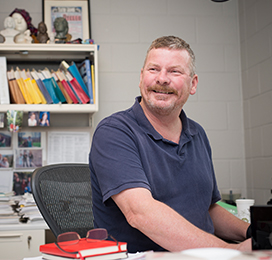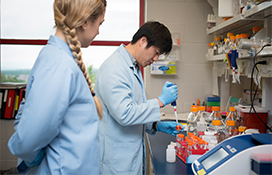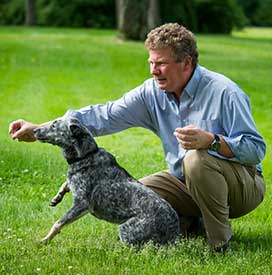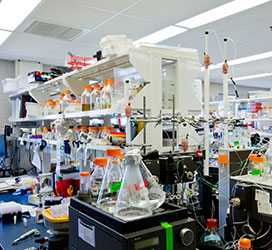Colin Parrish, PhD

John M. Olin Professor of Virology
Baker Institute for Animal Health
Baker Institute for Animal Health Lab WebsiteBaker Institute for Animal Health
235 Hungerford Hill Road
Ithaca, NY 14853
Department of Microbiology and Immunology
Cornell University College of Veterinary Medicine
Ithaca, NY 14853
Profile
Research/Clinical Interests
The emergence of new viral diseases in dogs
The Parrish laboratory has been studying viruses that have emerged in dogs to cause new diseases, which include several important viruses of dogs, cats, and wildlife. Together with his team, Parrish is showing in detail how those viruses jumped into and spread between dogs and how they sometimes infect other animals – including cats and wild species such as raccoons and foxes. They are also revealing more details about how those viruses infect and spread between dogs, as well cause disease in the other animals they infect.
- Canine influenza viruses: emergence and spread. There are currently two influenza viruses circulating in dogs in the USA – called H3N8 and H3N2 - and the Parrish laboratory is studying both of those. The most recent virus became an urgent concern for dog owners in the United States when a large outbreak of respiratory disease caused by the H3N2 strain of canine influenza virus began in the Chicago area in early 2015. Veterinarians turned to the Animal Health Diagnostic Laboratory in Cornell’s College of Veterinary Medicine and to the Baker Institute for answers about that virus. Parrish and his team have been studying the virus responsible for the epidemic and are now pinpointing its relationship to influenza viruses infecting dogs elsewhere in the world, and also to influenza viruses that infect other animals, including humans. They have determined that the virus, which has since spread to dogs in dozens of states in the USA, originated from Korea, where the virus has been spreading among dogs for many years.
- Investigating ways to stop canine influenza. Parrish and his colleagues are working with a team of experts from all over the country to compare the genetic signatures of both the H3N2 and H3N8 canine influenza viruses from regional outbreaks to track the spread of the disease, with the aim of determining new ways of controlling the viruses and eventually eradicating those viruses from dogs. The laboratory is also studying the biology of the canine influenza viruses to identify the properties that allowed them to be successful in dogs.
- How parvovirus can pass from species to species. The Parrish laboratory is also continuing work on canine parvovirus, which first emerged in the late 1970s as a brand new disease in dogs. Since then the virus is passed between dogs and also frequently transfers to a variety of wild animals, including raccoons, foxes, and skunks. Parrish and his colleagues have studied the complex particle structure that forms the outside of the virus and found that key changes in the outside of the virus alter the ways in which the viruses interact with cells, and also have shown that mutations can arise that alter the virus’ ability to infect those different species.
Education
- 1984
Cornell University, Ithaca, New York, USA
- Veterinary Virology
- Ph.D. - 1979
Massey University, Palmerston North, New Zealand
- Microbiology
- B.Sc. (1st Class Honors) - 1975
Auckland Technical Institute, Auckland, New Zealand
- Microbiology and Biochemistry
- New Zealand Certificate of Science
Biography/Professional Experience
- John M. Olin Professor of Virology 2005 - present
- Director, Baker Institute for Animal Health and Feline Health Center 2010 - 2016
- Professor 2002 - 2005
- Associate Professor 1994 - 2002
- Assistant Professor 1988 - 1994
Baker Institute for Animal Health | Department of Microbiology and Immunology | Cornell University College of Veterinary Medicine (CVM) - Research Officer 1986 - 1988
Department of Microbiology | Monash University, Clayton, Victoria, Australia - Research Assistant Professor (non-tenure track) 1984 - 1986
James A. Baker Institute for Animal Health | Department of Microbiology and Immunology | CVM - Graduate Research Assistant 1980 - 1984
James A. Baker Institute for Animal Health | Department of Microbiology and Immunology | CVM - Scientist 1979 - 1980
Virology Section | Animal Health Reference Laboratory | New Zealand Ministry of Agriculture and Fisheries - Technician 1973 - 1975
Plant Diseases Division | Department of Scientific and Industrial Research | Auckland, New Zealand
Professional/Academic Affiliations
Scientific Societies
- American Society for Microbiology
- Society for General Microbiology
- American Society for Virology
Publications
Link to all publications
See all publicationsAdditional Information
Dr. Colin Parrish’s Current Projects:
- Parvovirus host range variation and control
- Influenza viruses in dogs - two canine viruses that arose from viruses of horses and of birds
- Parvovirus capsid structures and interactions with receptors and antibodies
- The host transferrin receptors and their interactions with viral capsids
- Evolution of parvoviruses and influenza virus
- Virus structure – receptor and antibody interactions
Additional Resources:
If you would like a copy of Dr. Parrish's CV please email Jamie Weber






